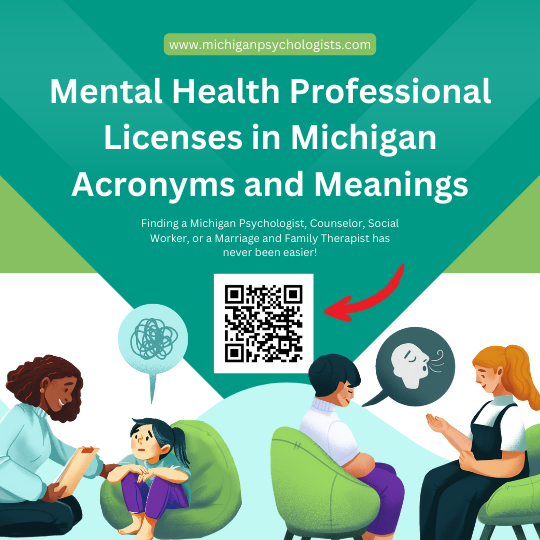Mental Health Professional Licenses in Michigan: Acronyms and Meanings
Home » Mental Health Professional Licenses in Michigan: Acronyms and Meanings

Table of Contents
Navigating the world of mental health professionals can be confusing, especially with the variety of licenses and credentials they hold. Each type of license reflects the professional’s level of education, training, and experience, but it’s important to remember that all these professionals share a common goal: to provide effective mental health care. While their licenses signify their qualifications, the clinical rapport they build with their clients is what truly sets them apart. Below, we detail the different types of licenses you might encounter, helping you understand what each one means.
Licensed Psychologist (LP)
Description: An LP is a fully licensed psychologist who has completed a doctoral degree in psychology. These professionals are qualified to practice independently, offering a wide range of psychological services, including assessments, therapy, and research. Their extensive training equips them to handle complex mental health issues.
Doctoral Educational Limited License Psychologist (DLLP)
Description: A DLLP is a doctoral candidate who has not yet completed all the requirements for full licensure. These individuals can practice under the supervision of a licensed psychologist, gaining practical experience while they complete their educational and licensure requirements.
Limited Licensed Psychologist (LLP)
Description: An LLP holds a master’s degree in psychology and is authorized to provide psychological services under supervision. While they have not attained a doctoral degree, LLPs have received substantial training and are capable of delivering quality mental health care.
Temporary Limited Licensed Psychologist (TLLP)
Description: A TLLP is a professional who is temporarily licensed to practice psychology while completing the required supervised experience for LLP status. This license allows them to gain the necessary experience under supervision before becoming fully licensed.
Licensed Masters Social Worker (LMSW)
Description: An LMSW is fully licensed to practice social work independently, having completed a master’s degree in social work. These professionals provide a range of services, including therapy, case management, and advocacy, addressing both mental health and social issues.
Limited Licensed Masters Social Worker (LLMSW)
Description: An LLMSW has earned a master’s degree in social work but must practice under supervision until they meet the requirements for full licensure. They are still capable of providing effective social work services, including support and counseling.
Licensed Professional Counselor (LPC)
Description: An LPC is fully licensed to practice counseling independently, holding a master’s degree in counseling. These counselors are trained to help individuals with a variety of issues, from mental health disorders to life transitions, using therapeutic techniques.
Limited Licensed Professional Counselor (LLPC)
Description: An LLPC has a master’s degree in counseling but must practice under supervision until they achieve full licensure. This stage allows them to develop their skills while providing counseling services under the guidance of an experienced professional.
Licensed Marriage and Family Therapist (LMFT)
Description: An LMFT is fully licensed to practice marriage and family therapy independently, having completed a master’s degree in marriage and family therapy. These therapists specialize in working with couples and families, addressing relational dynamics and conflicts.
Limited Licensed Marriage and Family Therapist (LLMFT)
Description: An LLMFT holds a master’s degree in marriage and family therapy but must practice under supervision until fully licensed. They focus on helping families and couples navigate their relationships and resolve conflicts, gaining experience as they work towards full licensure.
Understanding the various licenses held by mental health professionals can help you make informed decisions about your care. While the type of license reflects the professional’s qualifications and training, it is the clinical rapport they establish with you that ultimately defines the quality of the therapeutic relationship. By choosing a licensed professional, you can be confident in their ability to provide competent, ethical, and effective mental health services.